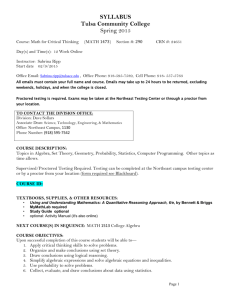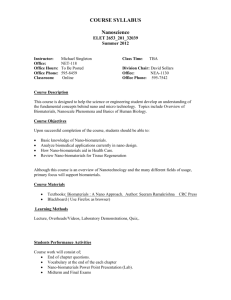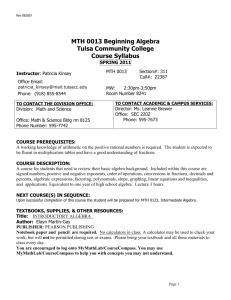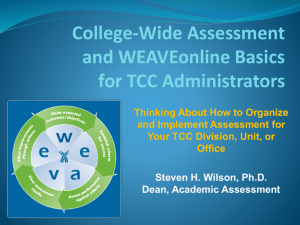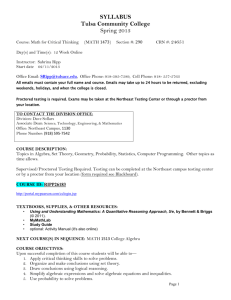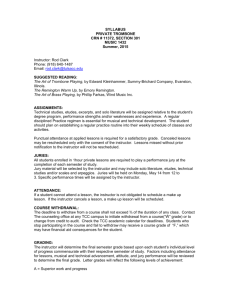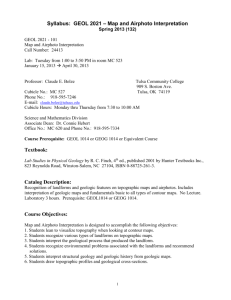MATH_1513_201_12439_201410 - Blackboard
advertisement
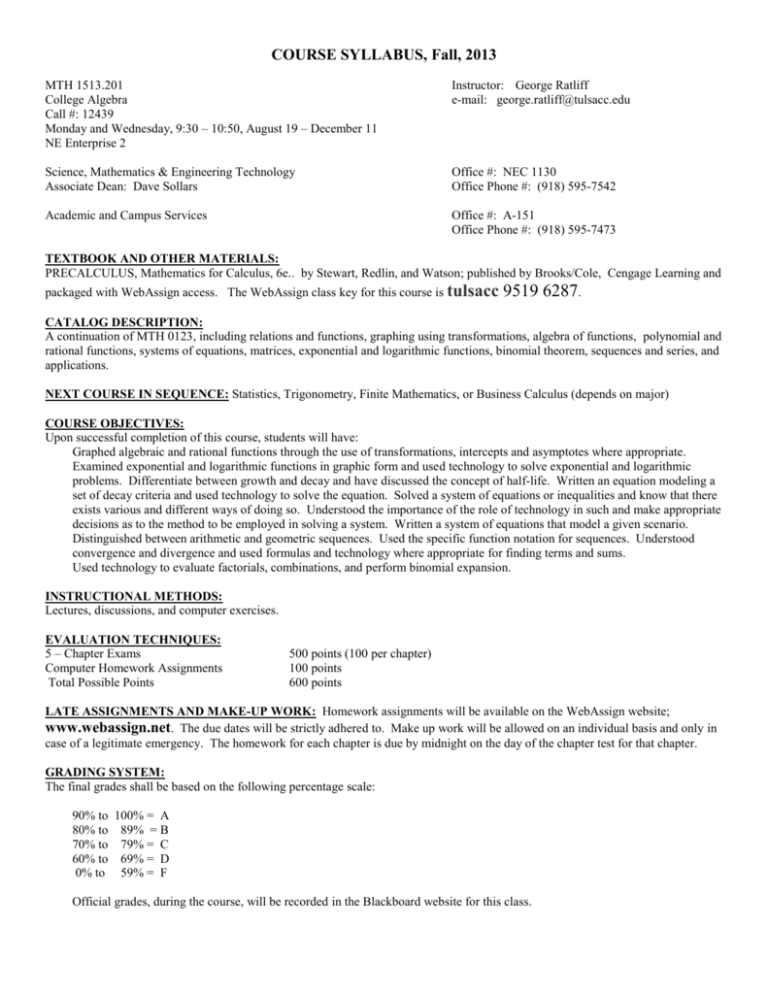
COURSE SYLLABUS, Fall, 2013
MTH 1513.201
College Algebra
Call #: 12439
Monday and Wednesday, 9:30 – 10:50, August 19 – December 11
NE Enterprise 2
Instructor: George Ratliff
e-mail: george.ratliff@tulsacc.edu
Science, Mathematics & Engineering Technology
Associate Dean: Dave Sollars
Office #: NEC 1130
Office Phone #: (918) 595-7542
Academic and Campus Services
Office #: A-151
Office Phone #: (918) 595-7473
TEXTBOOK AND OTHER MATERIALS:
PRECALCULUS, Mathematics for Calculus, 6e.. by Stewart, Redlin, and Watson; published by Brooks/Cole, Cengage Learning and
packaged with WebAssign access. The WebAssign class key for this course is tulsacc
9519 6287.
CATALOG DESCRIPTION:
A continuation of MTH 0123, including relations and functions, graphing using transformations, algebra of functions, polynomial and
rational functions, systems of equations, matrices, exponential and logarithmic functions, binomial theorem, sequences and series, and
applications.
NEXT COURSE IN SEQUENCE: Statistics, Trigonometry, Finite Mathematics, or Business Calculus (depends on major)
COURSE OBJECTIVES:
Upon successful completion of this course, students will have:
Graphed algebraic and rational functions through the use of transformations, intercepts and asymptotes where appropriate.
Examined exponential and logarithmic functions in graphic form and used technology to solve exponential and logarithmic
problems. Differentiate between growth and decay and have discussed the concept of half-life. Written an equation modeling a
set of decay criteria and used technology to solve the equation. Solved a system of equations or inequalities and know that there
exists various and different ways of doing so. Understood the importance of the role of technology in such and make appropriate
decisions as to the method to be employed in solving a system. Written a system of equations that model a given scenario.
Distinguished between arithmetic and geometric sequences. Used the specific function notation for sequences. Understood
convergence and divergence and used formulas and technology where appropriate for finding terms and sums.
Used technology to evaluate factorials, combinations, and perform binomial expansion.
INSTRUCTIONAL METHODS:
Lectures, discussions, and computer exercises.
EVALUATION TECHNIQUES:
5 – Chapter Exams
Computer Homework Assignments
Total Possible Points
500 points (100 per chapter)
100 points
600 points
LATE ASSIGNMENTS AND MAKE-UP WORK: Homework assignments will be available on the WebAssign website;
www.webassign.net. The due dates will be strictly adhered to. Make up work will be allowed on an individual basis and only in
case of a legitimate emergency. The homework for each chapter is due by midnight on the day of the chapter test for that chapter.
GRADING SYSTEM:
The final grades shall be based on the following percentage scale:
90% to 100% = A
80% to 89% = B
70% to 79% = C
60% to 69% = D
0% to 59% = F
Official grades, during the course, will be recorded in the Blackboard website for this class.
How to access your grade upon completion of the course:
Access your final grade when posted on Blackboard.
ATTENDANCE POLICY
Attendance will be checked daily by the instructor. If you arrive late, it is your responsibility to notify the instructor to get credit for
class attendance for that day.
If you miss 3 or fewer classes during the semester, you will have your homework average substituted for your lowest chapter test
grade, unless to do so would not improve your grade. You must still take all 5 exams to receive credit for the course.
COURSE WITHDRAWAL: Course Withdrawal: The deadline to withdraw from a course shall not exceed 3/4 the duration of any
class. Check the TCC Academic Calendar for the deadline that applies to the course(s). Begin the process with a discussion with the
faculty member assigned to the course. Contact the Advisement Office at any TCC campus to initiate withdrawal from a course ('W'
grade) or to change from Credit to Audit. Withdrawal and/or change to an audit from a course after the drop/add period can alter the
financial aid award for the current and future semesters. Students may receive an outstanding bill from TCC if the recalculation leaves
a balance due to TCC. Students who stop participating in the course and fail to withdraw may receive a course grade of “F,” which
may have financial aid consequences for the student. (FOR THIS CLASS, ¾ OF THE CLASS EQUATES TO Friday, November 6).
Communications:
Email communications: All TCC students receive a designated Outlook email address (ex: jane.doe@tulsacc.edu). All
email communications to you will be sent to your TCC email address; and you must use the TCC email system to send
email to, and receive email from, the instructor regarding this course.
Inclement Weather: TCC rarely closes. If extreme weather conditions or emergency situations arise, TCC always gives
cancellation notices to radio and television stations. This information is also posted on the TCC website
(www.tulsacc.edu).
General Education Goals: General Education courses at TCC ensure that our graduates gain skills, knowledge, and
abilities that comprise a common foundation for their higher education and a backdrop for their work and personal lives.
TCC’s General Education goals are: Critical Thinking, Effective Communication, Engaged Learning, and Technological
Proficiency.
Classroom Etiquette: Open and mutually respectful communication of varied opinions, beliefs, and perspectives during classroom or
online discussion encourages the free exchange of ideas that is essential to higher learning and to the ability to learn from each other.
Use of any electronic device is at the discretion of the instructor.
Syllabus Changes: Occasionally, changes to the syllabus may be necessary. Students will be notified of any changes to the syllabus
in class verbally and in writing via TCC email.
Disability Resources:
It is the policy and practice of Tulsa Community College to create inclusive learning
environments. Accommodations for qualifying students in compliance with the Americans with Disabilities Act
(ADA) and Section 504 of the Rehabilitation Act are available. To request accommodations, contact the
Education Access Center (EAC) at eac@tulsacc.edu or call (918) 595-7115 (Voice). Deaf and hard of hearing
students may text (918) 809-1864.
Tobacco Free College
Tulsa Community College is a Tobacco Free college in accordance with the Governor’s Executive Order 2012-01 and Title 63 of the
Oklahoma Statutes, Section 1-1523 which prohibits smoking or the use of any tobacco products in all public places, in any indoor
workplace, and all vehicles owned by the State of Oklahoma and all of its agencies and instrumentalities. This Order includes
property leased, rented, or owned by TCC including, but not limited to, all grounds, buildings, facilities, and parking lots. Tulsa
Community College’s policy includes a tobacco free environment on all campus and off-campus locations conducting TCC credit or
non-credit classes. The TCC Campus Police is responsible for ensuring compliance with the Tobacco-Free Environment Policy.
Violations of the policy may be addressed through issuance of campus or state citations.
Academic Dishonesty: Academic dishonesty (cheating) is defined as the deception of others about one’s own work or about the work
of another. Academic dishonesty or misconduct is not condoned or tolerated at campuses within the Tulsa Community College
system. Tulsa Community College adopts a policy delegating certain forms of authority for disciplinary action to the faculty. Such
2
disciplinary actions delegated to the faculty include, but are not limited to, the dismissal of disrespectful or disorderly students from
classes. In the case of academic dishonesty a faculty member may:
require the student to redo an assignment or test, or require the student to complete a substitute assignment or test;
Record a "zero" for the assignment or test in question;
Recommend to the student that the student withdraw from the class, or administratively withdraw the student from
the class;
Record a grade of "F" for the student at the end of the semester.
Faculty may request that disciplinary action be taken against a student at the administrative level by submitting such
request to the Dean of Student Services.
Institutional Statement: Each student is responsible for being aware of the information contained in the TCC Catalog,
the TCC Student Policies & Resources Handbook, and semester information listed in the class schedule. All information
may be viewed on the TCC website: www.tulsacc.edu
TENTATIVE CLASS SCHEDULE: College Algebra, Sec. 201, Fall, 2013
Aug 19 Syllabus, Review, WebAssign (key tulsacc 9519 6287)
21 2.1, 2.2
26 2.3, 2.4
28 2.5
Sep 2 Labor Day, no class
4 2.6
9 2.7, Test 2 Review
11 Chapter 2 Test
16 3.1
18 3.2
23 3.3
25 3.4
30 3.7, Test 3 Review
Oct
2 Chapter 3 Test
7 4.1, 4.2
9 4.3, 4.4
14 4.5
16 4.6, Test 4 review
3
21 Chapter 4 Test
23 10.1
28 10.2
30 10.3
Nov
4 10.4
6 10.5
11 10.6, Test 10 review
13 Chapter 10 Test
18 12.1
20 12.2
25 12.3
Thanksgiving Break, Nov 27 – Dec 1
Dec 2 12.6
4 Test 12 review
11 Chapter 12 Test
4

